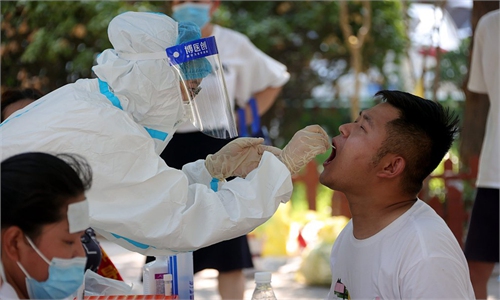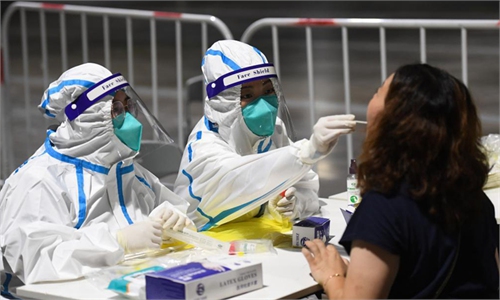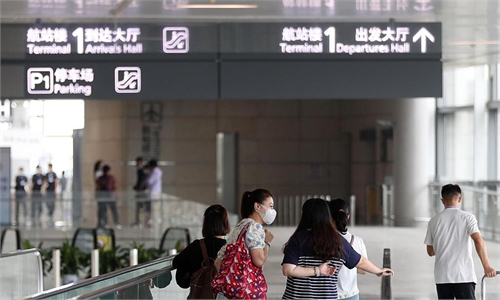Delta variant challenges China's hard-won epidemic victory
Epidemiologists confident in controlling latest outbreaks, most serious since Wuhan
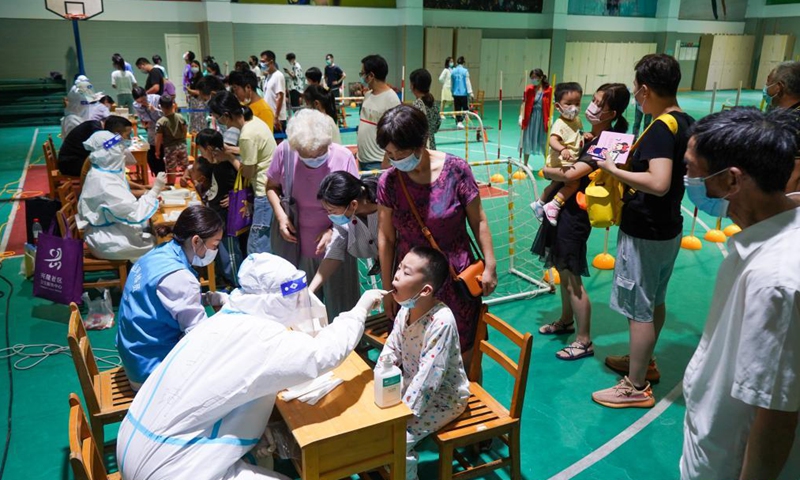
Medical workers take swab samples from residents for COVID-19 test at a testing site in Nanjing, East China's Jiangsu Province, July 21, 2021.Photo:Xinhua
Fresh COVID-19 outbreaks in multiple cities across China sparked new concerns about whether the outbreak in eastern Chinese city Nanjing would lead to a nationwide resurgence in cases, and whether the current vaccines can successfully fend off the risks brought by the rampant Delta variant. Some have raised doubts over whether the rigorous prevention measures adopted over the past year will still work.
Chinese epidemiologists and public health officials said on Sunday that the ongoing outbreaks - the most serious one since the initial outbreak in Wuhan - are still under control, but more efforts are needed to plug the loopholes in the epidemic control work, while stressing the need to advance the mass vaccination program and not relax daily personal disease prevention measures.
In July, there were more than 320 domestically transmission cases reported across China, posing serious challenges to the country's hard-won victory in the epidemic battle. The latest domestically transmitted cases have spread to at least 18 provinces and dozens of cities, resulting in at least four high-risk areas and 91 medium-risk areas as of press time on Sunday.
This new wave of the Delta variant strain outbreak first occurred in Nanjing, East China's Jiangsu Province, and spread from there to more locations, including the tourist hotspot of Zhangjiajie in Central China's Hunan Province, which became another flash point. Tourists returning from Zhangjiajie carried the virus with them when they returned home, including to the Chinese capital.
Beijing reported two new cases on Sunday and one asymptomatic infection related to the Zhangjiajie outbreak, and genetic sequencing on Saturday showed they are the Delta variant and linked to the mutated strain found in Nanjing.
Authorities in Central China's Henan Province confirmed on Sunday that an outbreak in Zhengzhou was also caused by the Delta variant, which is still at the early stage of the epidemic.
Zhengzhou, which was recently hit by unprecedented rainfall and floods, reported 12 confirmed cases of COVID-19 and 20 asymptomatic infections on Saturday. Most of the infected were in the city's Sixth People's Hospital, a designated hospital for handling imported COVID-19 infections in the city. New infections involved janitors, medical staff and inpatients, which exposes gaps in the hospital's disease protocols.
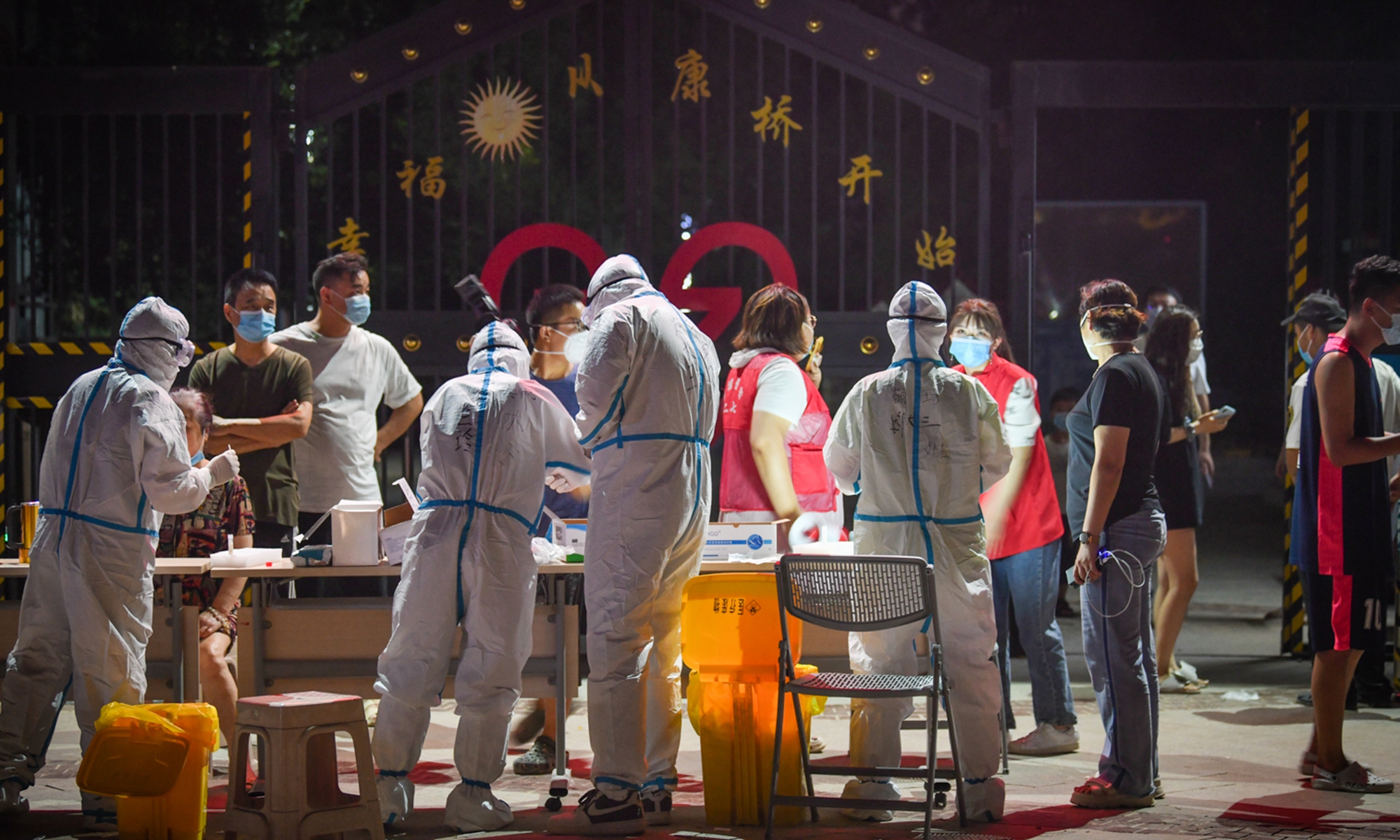
Photo: VCG
Chinese epidemiologists and public health officials evaluated that the latest outbreaks are still in the early stages and it's too soon to talk about inflection points now, but said the situation is under control.Whether the epidemic in smaller cities would spread remain unknown, but the failings in epidemic controls at airports and other facilities for coping with international arrivals must be addressed urgently, experts said.
With the experience accumulated in fighting the outbreak in Wuhan and in containing the sporadic outbreaks in other Chinese locations, for example, the June outbreak linked to the Delta variant in South China's Guangdong Province, the latest outbreaks are expected to be successfully contained.
However, epidemiologists warned that if the rigorous measures cannot be effectively imposed, China could face another full-scale outbreak.
New waves
Impacted by the surge in cases, provinces and cities in China have tightened epidemic prevention and control measures over the weekend. Disease control authorities in Beijing and South China's Guangdong Province issued notices urging residents not to leave the city and province unless necessary.
Some key points of resurgence such as Zhangjiajie have put in place the most rigorous measures on Sunday. The popular tourist site and inspiration for the scenery of James Cameron's blockbuster Avatar, issued a stay-at-home order for all residents and imposed strict traffic control, entering a quasi-lockdown model.
This wave of domestic outbreaks started with infections in members of cleaning crews at Nanjing Lukou International Airport, later spreading to more people locally and in other provinces after people traveled via Nanjing to Zhangjiajie.
"It's still too early to predict when the inflection point will come for the current outbreak, which has been spreading to more places," an official close to the National Health Commission who spoke on condition of anonymity told the Global Times on Sunday.
We will take the utmost efforts in containing the spread, and at the same time, accelerate mass vaccinations as quickly as possible, the official said.
China's top respiratory disease specialist, Zhong Nanshan said at an event on Saturday that he is less worried about the coronavirus control in Nanjing, because the city is doing a good job in epidemic prevention and control but whether the epidemic in Zhangjiajie, which is much smaller, will continue to spread is unknown.
Changde, a city 150 kilometers from Zhangjiajie, said on Sunday that 777 people related to another local show are now classified as being in a high-risk group after the director of the show tested positive for coronavirus. The director's transmission chain can also be traced to Zhangjiajie.
Most places are still in the early stage of the latest outbreaks. Considering the experience of handling the Delta variant in Guangzhou and Shenzhen in Guangdong Province, and Ruili, a city of Yunnan that borders Myanmar, we know the Delta variant is highly transmissible and spreads very fast. But with strict measures imposed, the previous sporadic outbreaks were contained within a short period, Wang Guangfa, a respiratory expert at Peking University First Hospital, told the Global Times on Sunday.
"I believe that with all-out efforts and our past experience, in addition to enhanced public awareness, we can contain the current outbreaks eventually," he said.
A booster shot?
The latest outbreak resurgence in Nanjing and Zhengzhou exposes serious failings in management. Experts called for more rigorous epidemic prevention measures.
Some of the people who have been fully vaccinated were still tested positive, called breakthrough infections, which sparked online discussion about whether a booster shot is now necessary as part of enhanced epidemic prevention work.
Chinese public health officials said the current vaccines are still effective against all the variants so far, and can protect people from severe syndrome and hospitalization.
Leading Chinese epidemiologist Li Lanjuan who played a vital role in fighting the epidemic in Wuhan in 2020 was quoted by media reports on Sunday as saying that her research team is studying a booster shot targeting the Delta variant.
"Authorities are currently studying whether it's necessary to take a booster shot," Shao Yiming, a leading physician and immunologist from the Chinese Center for Disease Control and Prevention, told the Global Times on Sunday.
He affirmed in a press conference on Saturday that all existing prevention measures are well conducted in practice and China's vaccination speed is globally leading, leaving no grounds for large-scale outbreaks.


